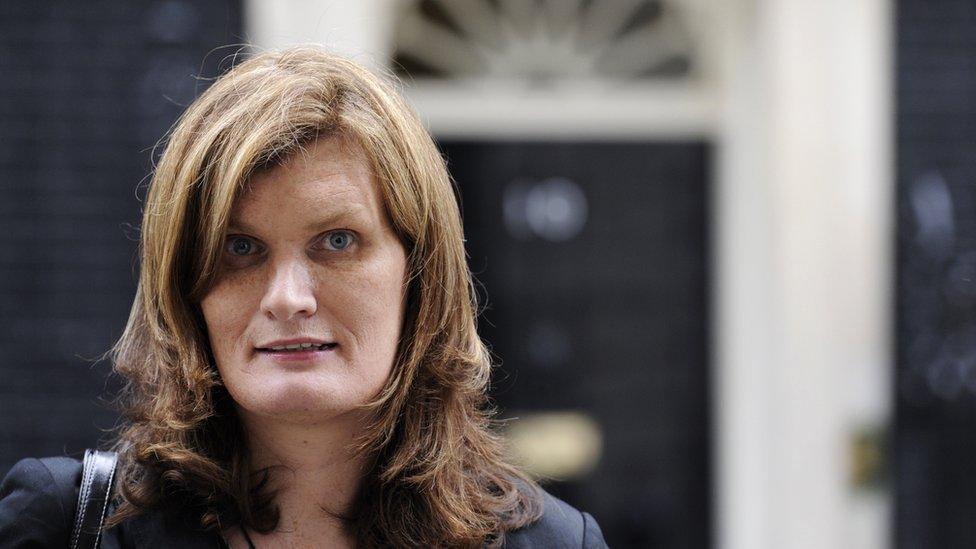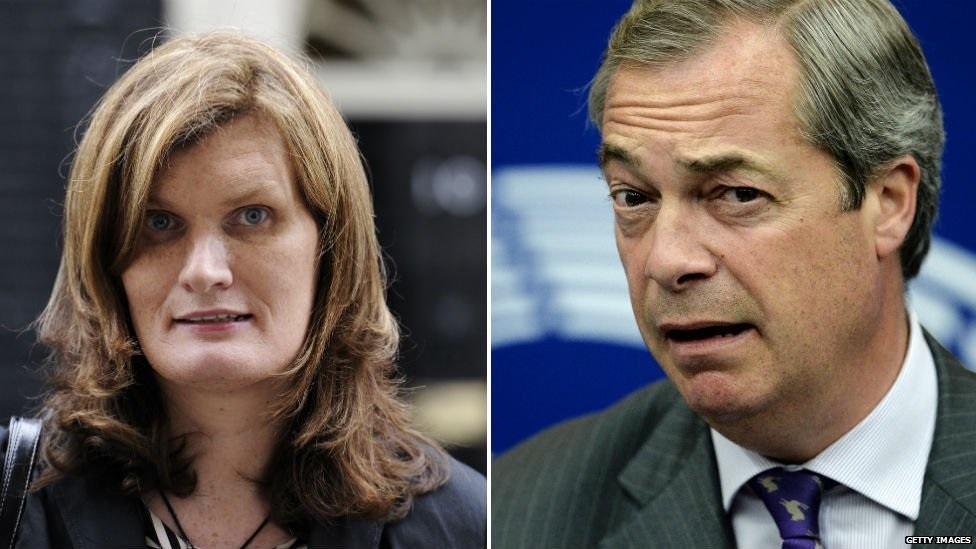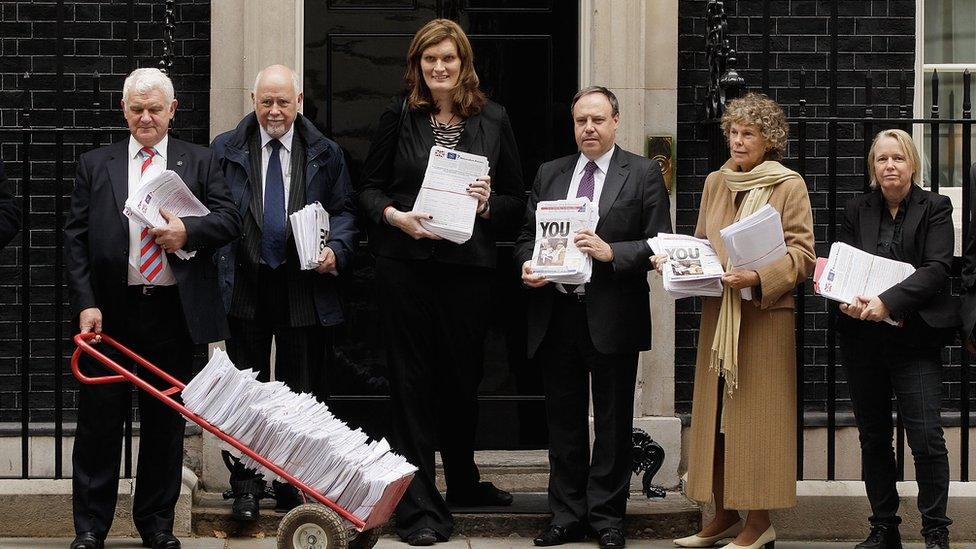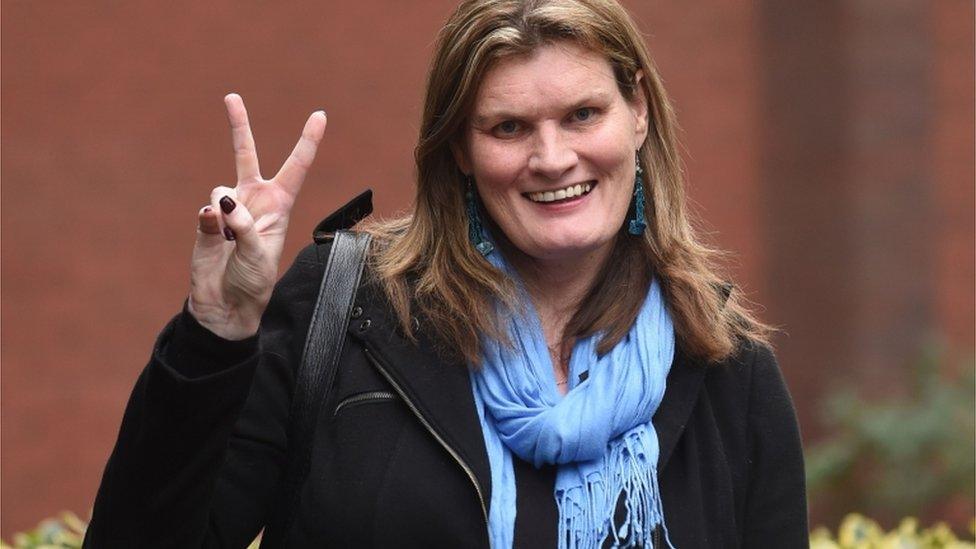Nikki Sinclaire: 'I have this thing about injustice'
- Published

Nikki Sinclaire became interested in politics aged just eight
The UK's first transsexual parliamentary politician Nikki Sinclaire has spent much of her life fighting battles - personal and professional.
As she is cleared of misconduct in a public office and fraud charges the BBC looks at her political and private life.
The title of Nikki Sinclaire's second book, Never Give Up, is a clear indication of her determination.
"Because of the things that have happened to me, I have this thing about injustice. I feel I have to stand up whether it's myself, or other people," she told the BBC following its launch.
"I hate it when authorities put down ordinary people and I feel the need to stand up for them."

The court heard Nikkie Sinclaire had a "poor" relationship with then UKIP leader Nigel Farage
Her resolve emerged at a very young age. She was just eight years old when she became interested in politics while watching the news after school.
But it was a couple of years later, during the Winter of Discontent, external, that her interest really peaked.
"My father supported the unions and I would question him - why this conflict? I thought the unions were supposed to be for the working man, and also the Labour Party?
"He could never answer that satisfactorily to me. Coming from a very poor, working-class council estate, I began to think 'why don't we have these things?'
Her "very working class" father was "perturbed" when he learned of her admiration for Margaret Thatcher.
As her political obsession intensified in her teens, so did a very private struggle.
Since the age of three, she believed she was trapped in the wrong body.
It wasn't until she reached 16 that Ms Sinclaire confided her feelings to a doctor, spilling out "16 years of hurt", only to be told it was a "fantasy".
Undeterred, she eventually underwent gender reassignment surgery at 23.
A staunch Eurosceptic, she became an active member of UKIP and held many positions within the party. After 10 years - and two defeats in UK general elections - she was successfully voted in as the party's MEP for the West Midlands in June 2009.

Sinclaire gathered 100,000 signatures on a petition calling for an EU referendum
But her success within UKIP was short-lived. Just nine months later, in March 2010, Ms Sinclaire was expelled from the party, external after refusing to take part in a multi-national group it had joined in the European Parliament, citing some members "homophobic views".
It was a blow she was not going to accept easily. In December that year, having taken her former bosses to a tribunal, a judge found in her favour when UKIP failed to file a defence in time.
As an independent MEP, Ms Sinclaire continued her tireless campaign for a referendum on Europe.
In 2011, she gathered 100,000 names to a petition, which led to a Conservative rebellion of about 70 MPs, and "forced David Cameron to the despatch box", a proud Ms Sinclaire later told the BBC.
Again, the joy was short-lived. By February 2012, West Midlands Police had begun their fraud investigation and arrested Ms Sinclaire on suspicion of defrauding the European Parliament.

Nikki Sinclaire arriving at court for her trial. She said the expenses were either mistakes by staff or, in at least on claim, were "deliberately corrupted".
"The allegations at hand are old allegations from a disgruntled ex-employee", Ms Sinclaire said in a statement, adding she had "nothing to hide".
The following year, Ms Sinclaire decided to reveal her gender reassignment secret, which she said was the result of threats from UKIP and journalists.
She later went on to say she had been "overwhelmed" by the support from members of the public.
In June 2014, Ms Sinclaire lost her seat to Labour's Neena Gill and a month later, more than two years after her first police interview, she was charged with money laundering and misconduct in public office.
She was accused of making false and dishonest submissions for travelling expenses and transferring the proceeds of fraud through a bank account - something the politician said she "strongly refuted".
It took another two years for the case to come to court, ironically, scheduled just days after Ms Sinclaire's British independence dream came true.
The day after the referendum, there was not a hint of the impending court proceedings on her Twitter account.
Instead, as she celebrated the victory, her doggedness shone through once again.
"We did it Maggie," she tweeted. "We did it. We got our country back. I never gave up."